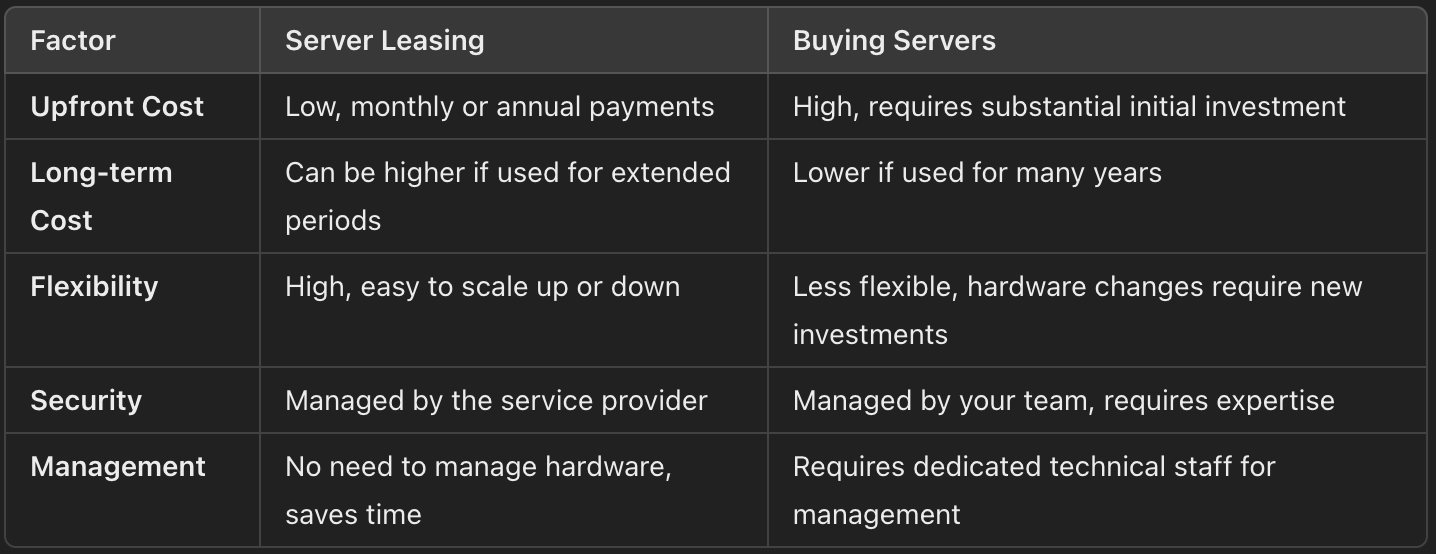Introduction
Opening: Clear Definitions of Server Leasing and Buying Servers
In the modern technology world, choosing the right server solution for your business is a crucial decision that significantly impacts both performance and operational costs. Two of the most common solutions are Server Leasing and Buying Servers. Each solution has its own advantages and disadvantages, depending on the specific needs and financial conditions of the business.
- Server Leasing refers to renting a server from a service provider instead of purchasing hardware. Businesses typically pay a monthly or annual fee based on the server configuration they need.
- Buying Servers involves purchasing physical servers that the business owns. This requires a large initial investment but does not incur ongoing rental fees.
Why Do You Need a Server?
Servers play a critical role in storing and processing data for all business operations, especially in today’s digital age. Servers support services such as website hosting, databases, email, customer relationship management (CRM) software, and many other essential applications. A strong, stable server is essential for productivity and performance, ensuring smooth communication and uninterrupted service for customers.
Objective of This Article
This article aims to help you understand the key differences between Server Leasing and Buying Servers, allowing you to make the right decision for your business needs. We will analyze the pros and cons of each approach and provide criteria for choosing the most suitable option.
Server Leasing
Definition
Server Leasing, or renting a server, is a service where businesses pay a monthly or annual fee to rent a physical server from a service provider. The server can be configured according to business requirements, and the provider is responsible for maintaining the hardware and managing technical issues.
How It Works
When leasing a server, a business signs a contract with the service provider, selects the server configuration (including CPU, RAM, storage, bandwidth, etc.), and pays for the usage time. The service provider handles server maintenance, security, and technical support.

Advantages of Server Leasing
- Flexibility, easy scaling up or down:
- As your business grows, upgrading or changing the server configuration is simple. You can request changes without needing to invest in new hardware.
- Low upfront cost, predictable pricing:
- You don’t need to spend large amounts of capital upfront. Instead, you pay a monthly fee, which makes it easier for businesses to manage costs and budget effectively.
- No need to manage hardware, saving time and resources:
- The service provider takes care of all the hardware maintenance and troubleshooting, which saves your business time and resources.
- High security, managed by the provider:
- Service providers usually have dedicated security teams to protect the servers from cyber threats, ensuring a high level of security.
Disadvantages of Server Leasing
- Long-term costs can be higher:
- While the initial investment is low, if you lease a server over an extended period, the total cost may end up being higher than purchasing a server.
- Dependence on the service provider:
- Leasing a server means you are reliant on the provider for server uptime, maintenance, and support. If the provider experiences issues, your business may be affected.
- Limited hardware configuration options:
- Some providers have limitations on the hardware configurations you can choose from, which may not meet very specific needs.

Buying Servers
Definition
Buying servers involves investing in physical servers that the business owns entirely. These servers can be used for the long term, and businesses are not required to pay any recurring rental fees. However, they do need a technical team to manage and maintain the servers.
Common Types of Servers
- Rack Servers: Designed for installation in server racks, these servers save space and are easy to scale.
- Tower Servers: Similar to desktop PCs, these are typically used by smaller businesses or in cases where independent server use is required.
- Blade Servers: Used for large data centers, these servers are highly scalable but require specialized infrastructure.
Advantages of Buying Servers
- Complete control over hardware and software:
- When buying servers, you have full control over the hardware configuration and software, allowing you to customize them for your specific business needs.
- Optimized for specialized needs:
- If your business has unique requirements, buying servers enables you to configure them for optimal performance.
- Lower long-term cost:
- Although the initial investment is high, buying a server can be more cost-effective in the long run, especially if you use the servers for many years.
Disadvantages of Buying Servers
- High upfront cost:
- The initial investment in purchasing servers is substantial, which may not be feasible for smaller businesses or those with limited capital.
- Requires technical staff for management and maintenance:
- Managing and maintaining servers requires a skilled technical team. Without technical expertise, businesses may face difficulties in server management and upkeep.
- Time-consuming setup and configuration:
- Setting up and configuring servers can take a significant amount of time, which can delay operations and may disrupt business activities.
Detailed Comparison

Choosing the Right Solution
Assessing Your Business Needs
Before deciding between Server Leasing and Buying Servers, it is crucial to evaluate your business’s specific requirements. If your business needs flexibility, lower upfront costs, and does not want to manage hardware, Server Leasing may be the better choice. However, if you have special hardware needs, prioritize security, and want long-term control over your infrastructure, Buying Servers might be the best solution.
Criteria for Choosing
- Business Size: Small or medium-sized businesses may benefit from Server Leasing to reduce costs, while large enterprises may prefer Buying Servers to optimize performance.
- Budget: If your budget is limited, Server Leasing can provide a more affordable entry point without the need for significant upfront investment.
- Performance Requirements: Businesses with specialized performance needs may benefit from purchasing servers for greater customization.
- Security: Both solutions can offer high levels of security, but buying servers gives you full control over security protocols and measures.
Recommendations
- Server Leasing: Ideal for businesses that need flexibility, have limited capital, or do not want to deal with hardware management.
- Buying Servers: Best for businesses that require highly customized hardware, have in-house technical teams, and are looking for long-term investment.
Conclusion
Choosing between Server Leasing and Buying Servers depends on your business’s unique needs. Each solution has its advantages and disadvantages, and making the right choice can help optimize costs, security, and performance. We encourage you to assess factors such as budget, business size, and specific requirements before making a decision.
If you’re still unsure or need detailed guidance, don’t hesitate to reach out to reputable service providers for personalized advice.
* Contact us:
- Email: dc@dcx.com.vn
- Phone: 0333361599
- Facebook: https://www.facebook.com/DCX.Tech.Solutions/
